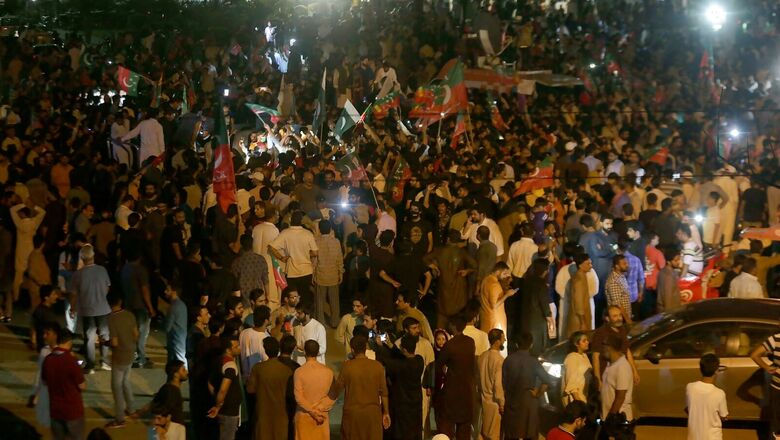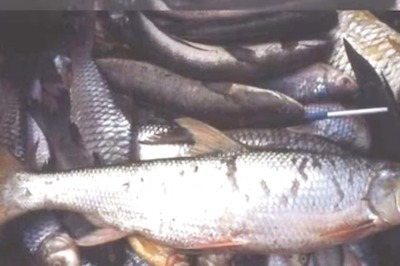
views
In a stunning and unexpected political manoeuvre, the Sharifs and the Zardari-Bhuttos got the better of Imran Khan (at least for now) to ensure that Prime Minister Shahbaz Sharif’s son Hamza Shahbaz continues as Chief Minister of Pakistan’s most important province — Punjab.
In a vote for the Chief Minister’s post in the Punjab Provincial Assembly on the evening of July 22, Deputy Speaker Dost Mohammad Mazari declared Hamza had prevailed over Chaudhari Pervez Elahi of the Pakistan Muslim League (Q) (PML-Q) even though Elahi who was supported by Imran Khan’s party Pakistan Tehreek-e-Insaf (PTI) had secured more votes than Hamza.
Mazari read out a letter from Chaudhari Shujaat Hussain, the president of the party, in which he stated that he had directed PML(Q) members of the assembly to vote for Hamza. Relying on a Supreme Court judgment, Mazari announced that he was disregarding the votes cast by the 10 members of PML(Q).
In the assembly, after Mazari had read out Shujaat Hussain’s letter, a PTI member cautioned him that he had misconstrued the Supreme Court judgment and the provisions of the Constitution which vested the powers of giving direction to assembly members in the head of a legislative party.
In this case, the head of the PML(Q) legislative party had directed that its members should vote for Elahi. However, Mazari disregarded the objection and declared Hamza as successful.
Immediately after the vote, Imran Khan gave a widely televised message in which he called on the people to stage peaceful protests. He asserted that the ‘arch dacoit’ Asif Ali Zardari, former president of Pakistan and currently co-chairman of Pakistan People’s Party (PPP), had come to Lahore to subvert the people’s will. He also said all eyes would now be on the Supreme Court.
He, thereby, indicated that the matter would be agitated in the court. Later, the PML(Q) faction of Pervez Elahi filed an application before the Lahore registry of the Supreme Court at around midnight. The registry was opened at that hour on the instructions of Supreme Court Chief Justice Umar Ata Bandial.
The court would now have to interpret Article 63-A of Pakistan’s Constitution fully and authoritatively. It had gone into this issue after the unseemly developments in April and May when it had responded to a Presidential Reference on the scope of this article. It had then held that a member was bound by the party’s decision in certain matters mentioned in the article, including in matters relation to votes of confidence/no-confidence against a Prime Minister or a Chief Minister. A member’s vote would be disregarded if it was against the party decision.
The Supreme Court had dramatically intervened then to quash the decision of the Deputy Speaker of Parliament who threw out a motion of no-confidence against then PM Imran Khan. It had directed that a vote on the motion be held. Khan’s party, the Pakistan Tehreek-e-Insaf (PTI) had abstained from voting and Shahbaz Sharif was elected Prime Minister.
In a repercussion of this development, 25 PTI members of the Punjab provincial assembly defying the party decision voted for Hamza. Initially, the proceedings in the assembly had turned violent necessitating the entry of the police into the legislative chamber. But later, the voting was held under the vigilant eye of the courts.
Following the Supreme Court advisory, the votes of PTI members in favour of Hamza were disregarded. The court directed that the assembly should decide between Hamza and Pervez Elahi after by-elections to the 20 seats of the disqualified members were held. The by-elections were conducted on July 17. Imran Khan campaigned vigorously and PTI candidates won 15 of the 20 seats while the Sharif’s party Pakistan Muslim League (N) (PML-N) secured only five seats.
This was an enormous loss and led to the unanimous view that Hamza would have to give way to Elahi. Further, PTI’s success would weaken the federal government of Shahbaz Sharif.
The PML(N) defeat in the Punjab by-elections can be attributed in part to the tough economic decisions that Shahbaz Sharif was compelled to take. The IMF insisted on the reduction of subsidies, especially on energy, before it released the next tranche of the loan to Pakistan. Sharif fell in line and steeply raised the price of petroleum products. That hit the common man making him unpopular.
Economic fragility also led to a great and continuing fall in the value of the Pakistani rupee, further raising inflation rates. Khan skilfully exploited public emotion making the people overlook his dubious actions of March and April to sustain his government even though it lost its majority in the National Assembly. He also kept hammering the themes of corruption and of foreign conspiracy, though the latter in a more muted way.
The matter has reached the Supreme Court. It will have to decide who has the authority within political parties to give directions to its members in a legislature on a vote of confidence/no-confidence relating to a Prime Minister or a Chief Minister? Is it the head of the party or the head of the legislative wing of the party? The text of the constitution states members of a legislative party must abide by the decisions of the ‘parliamentary party’.
A plain reading of the constitutional text indicates that the power vests in the head of the legislative wing of a party. At the same time, the constitutional scheme underlines that it is for the head of the party to decide that nature of disciplinary action against a member who has gone against a party’s instructions. That indicates that the constitutional scheme is based on belief that a party head and that the head of the party’s legislative wing will always act in harmony and not be at odds with each other as has happened in the PML(Q) case.
Here, while Chaudhari Shujaat Hussain issued instructions to vote in Hamza’s favour, the parties legislative wing decided to vote in favour of Elahi. The Supreme Court advisory emphasises the authority of the party over the will of the individual member. That is fine but the court will now have to address the issue in whom does a party’s authority vest in case a party head and the head of the legislative wing are at odds with each other. What is relevant is that Pakistan does not have any anti-defection law like in India which can act as a point of reference.
The falling out of the Shujaat Hussain and Pervez Elahi is a matter of substantial consequence for the politics of the Punjab province. They are cousins and Shujaat’s sister is married to Elahi. They have been very close politically but their sons who are in politics are not so.
What seems possible is the splitting of this powerful Warraich Jat family. However, between Shujaat and Asif Zardari, Elahi was offered the CM’s post supported by the PML(N) and PPP and the associated parties of these two. While Elahi declined nothing is permanent in politics; this is especially so in Pakistani politics.
Army’s Position
How is the Pakistani army refracting the Punjab developments? Army Chief issued instructions that no one from the force should intervene in the Punjab elections. This was in keeping with the Bajwa’s stance that the army was apolitical during the March and April political crisis which led to Imran Khan’s fall. All this is hardly believable because the Pakistan army has always manipulated the political process even when it has not been in direct political control of the country.
Bajwa is due to retire in end November. He has said that he will not accept a second extension. This is likely to be so. In that case his successor will have to be chosen by the incumbent Prime Minister. It has been clear that Bajwa does not want Imran Khan to choose the next army chief. Hence, Bajwa would want present political set up in Islamabad to continue till at least end October so that Shahbaz Sharif chooses the next army chief a general. Thus, he has an interest in the continuance of Hamza for his fall would impair the stability of Shahbaz Sharif led coalition government.
That will give some restless generals to play games especially as it is believed that Imran Khan is popular with the junior officers of the army. His anti-US stand contributed to this phenomenon. All in all, the army’s statements and actions will bear watching.
Pakistan’s economic woes will worsen and the rupee will remain volatile, at least in the short term. However, as this writer has noted previously, no country wants Pakistan’s economy to go the Sri Lanka way. It will be therefore, if nothing else, kept on a drip
Uncertainties and even confusion will continue in Pakistan. For how long will the army maintain its professed hands-off approach?
The writer is a former Indian diplomat who served as India’s Ambassador to Afghanistan and Myanmar, and as secretary, the Ministry of External Affairs. The views expressed in this article are those of the author and do not represent the stand of this publication.
Read all the Latest News and Breaking News here




















Comments
0 comment